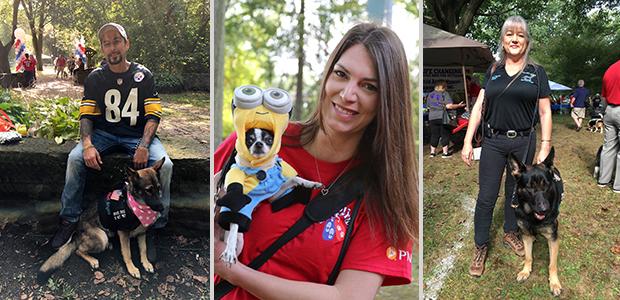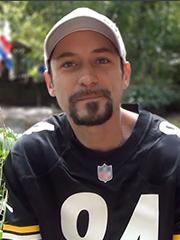A Soldier’s Best Friend
Medical service dogs bring curative powers to veterans suffering from PTSD, traumatic brain injury, seizure disorders, mobility issues and more.
With his service dog, Pilot, at his feet, Timothy Kellermann couldn’t help breaking down as he talked about his time serving in the 10thMountain Division and 82nd Airborne with the U.S. Army.
“I came home very withdrawn,” he said of his 13-month combat tour in Afghanistan.
It’s very hard to talk about. It’s hard to explain things when you get back, unless you went through it. I pushed everybody away.
It is an experience felt by many veterans who faced unimaginable circumstances while on active duty.
Paratrooper veteran John Kelly served with the 4th Brigade, 25th infantry division out of Anchorage, Alaska, and deployed to Afghanistan.
“Paratroopers go where the fight is, and fight where the fight is hardest,” said Kelly.
While serving overseas, Kelly watched five members of his brigade die. He came home and had a lot of trouble adjusting. Fast forward five years, and Kelly says he was at the point of suicide.
Fortunately, both men received medical service dogs through Guardian Angels Medical Service Dogs (GAMSD), and their outlooks on life and living changed almost immediately.
“I got my dog and she took all that away,” Kellermann said of his feelings of isolation and the nightmares he suffered. “Within the first week, just going through the pairing process, I got so much sleep I couldn’t believe it. Now I don’t have to feel a gun on me; I can actually sleep without one eye open. She guards me at night. It’s absolutely amazing.”
Though the movement to provide service dogs has gained traction in recent years, its history in the U.S. dates back to 1929 when the first dog guide school was established to serve the blind. During the 1960s, the practice of using service dogs to assist people with disabilities became more widespread. One of the first pairings of a service dog with an injured veteran was in 2005, when a National Guardsman lost his right lower leg in Iraq. Suffering from a brain injury and post-traumatic stress disorder, he was placed with a dog that assisted him with his physical needs and provided emotional support.
A $22,000 Investment that Saves Lives
In a lead-up to Veterans Day, nearly 600 people and their pets came to Pittsburgh’s Frick Park to take part in the second annual Community Mutt Strut. PNC Bank returned as event sponsor and helped raise approximately $300,000 to assist GAMSD in its efforts to train and pair service dogs with veterans suffering from PTSD, traumatic brain injury, seizure disorders, mobility issues and more. That’s $100,000 more than last year’s inaugural event, which raised enough to provide nine service dogs. With the proceeds, approximately 13 more veterans like Kellerman and Kelly could have the same experience of feeling safe again.
The need for fundraising is certainly there. Training a dog to look out for its human is a process that takes up to two years and costs about $22,000 – and that investment is well worth it, as it is estimated that 20 veterans take their own lives every day. In fact, GAMSD has paired more than 180 dogs with veterans since 2010, and of those pairings, not one life has been lost to suicide.
“It’s so important to be able to raise funds for these dogs, because we donate every one of them to a veteran recipient,” said Carol Borden, founder, executive director and CEO of GAMSD. “There are many levels of training that they have to go through to get to where they can behave in crowds, with many different things going on, and still be in tune with their handlers’ needs.”
For Jessica Taucher, a Mutt Strut participant and volunteer from PNC, taking part in the event was certain.
“I didn’t join the service, but I wanted to give to a cause that is near and dear to my heart,” the Pittsburgh resident said. Both of Taucher’s parents enlisted as Army reservists and, given their service as well as all the men in her family going back to her grandfather in World War II, Jessica felt the need to take part in the event, to “support those who have served, in honor of my family.”
Participants Help to Transform Lives
“Getting my dog has been absolutely life-changing,” Kellermann said.
“It’s been a crazy 10 years, and this last year has been amazing. I still have my moments, but it’s getting better. It isn’t a cure, but it is a big help. A very big help in the process.”
John Kelly agrees. “I went from someone who was completely isolated, not involved with my family at all. And now I’m Thomas the Train conductor, on the floor for hours at a time with my son. It’s great. I take my wife out on dates again. This is good.”


